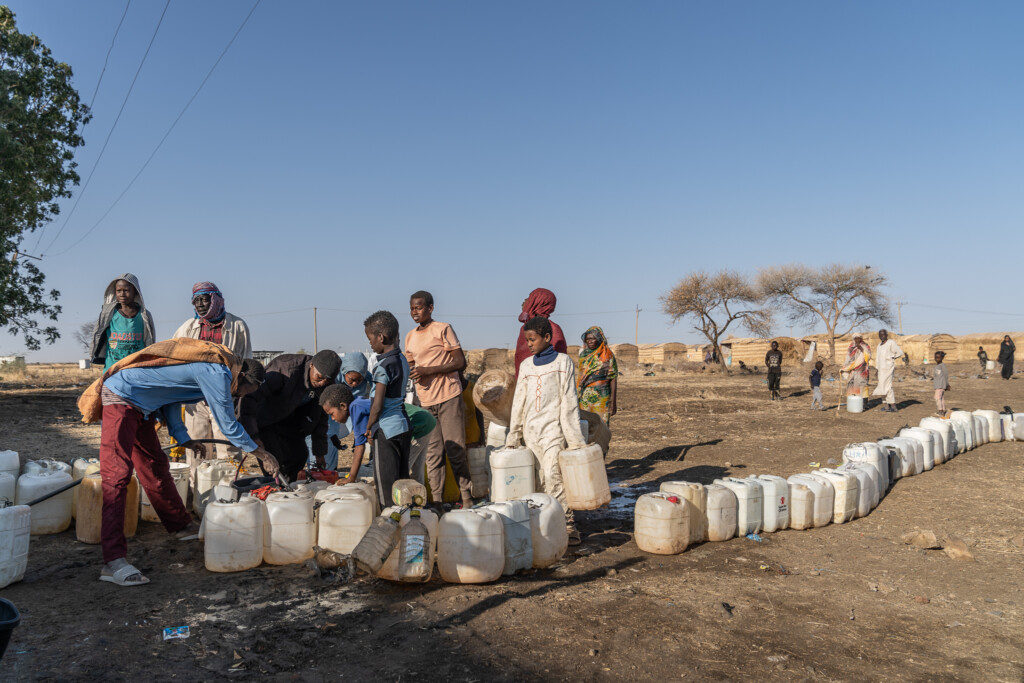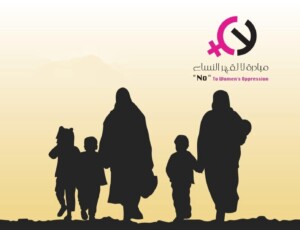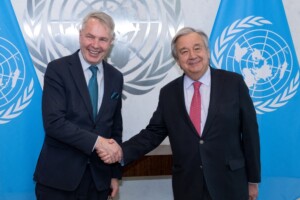UNDP condemns Sudan humanitarian attacks as ‘stain on our collective conscience’

Displaced adults and children queue to collect water from a solar-powered pump at the Abu El Naja gathering site for displaced people in El Gedaref (Photo: Giles Clarke / UNDP)
The United Nations Development Programme (UNDP) marked World Humanitarian Day on 19 August by highlighting the staggering toll on aid workers in Sudan, where at least 120 humanitarian staff were killed. UNDP Resident Representative in Sudan Luca Renda issued a statement from Port Sudan underscoring the significance of the day.
In a statement on Monday, Renda highlighted that “since the current conflict began in April 2023, more than 120 humanitarian personnel have been killed- nearly all of them Sudanese.”
Renda stressed that these figures “are more than just statistics.” He highlighted that the victims were medics, drivers, volunteers, and other staff who showed up daily to serve their communities with courage and compassion. He described their deaths as “a stain on our collective conscience and a stark reminder of the growing dangers faced by those delivering life-saving aid.”
The UNDP Sudan representative urged parties to “guarantee safe and unimpeded access, and ensure that humanitarian personnel can operate safely, independently and without interference.” He condemned the pattern of violations and impunity, warning: “Every red line crossed is met with impunity, indifference and failure to act. This must stop.”
He appealed to donors to “increase flexible funding to sustain and scale up life-saving operations across the country,” adding: “Today, we relaunch the global call to #ActForHumanity. They have not given up, and neither must we.”
Global figures
Provisional figures, according to the *Aid Worker Security Database, indicate 265 aid workers killed in the first eight months of 2025, as of August 14, 2025. Violence against aid workers increased across 21 countries, with state actors the most common perpetrators.
The UN stressed that such attacks violate international humanitarian law and recalled Security Council Resolution 2730 from May 2024, which reaffirmed obligations to protect humanitarian personnel and called for independent investigations into violations.
“A shocking new record of 383 aid workers killed in 2024 must be a wake-up call to protect all civilians in conflict and crisis and call time on impunity. Attacks on humanitarian workers, assets and operations violate international humanitarian law and undermine the lifelines that sustain millions of people trapped in war and disaster zones,” the OCHA statement read.
Under-Secretary-General for Humanitarian Affairs and Emergency Relief Coordinator Tom Fletcher condemned the surge in attacks on aid workers, stating: “Even one attack against a humanitarian colleague is an attack on all of us and on the people we serve.”
Fletcher described the scale of violence with as “a shameful indictment of international inaction and apathy,” and insisted “Violence against aid workers is not inevitable. It must end.”
He added, “As the humanitarian community, we demand – again- that those with power and influence act for humanity, protect civilians and aid workers and hold perpetrators to account.”
This year’s theme Strengthening Global Solidarity and Empowering Local Communities, highlights Sudan as an example of why such solidarity is not an abstract principle, but a matter of survival.
“The global #ActForHumanity campaign is relaunched with added urgency, calling on the public to stand with humanitarians, demand protection and support the lifelines they provide,” according to OCHA.
*The Aid Worker Security Database, the sole comprehensive global record of attacks on aid workers since 1997, tracks killings, kidnappings and injuries, providing the evidence behind this appeal.











 and then
and then